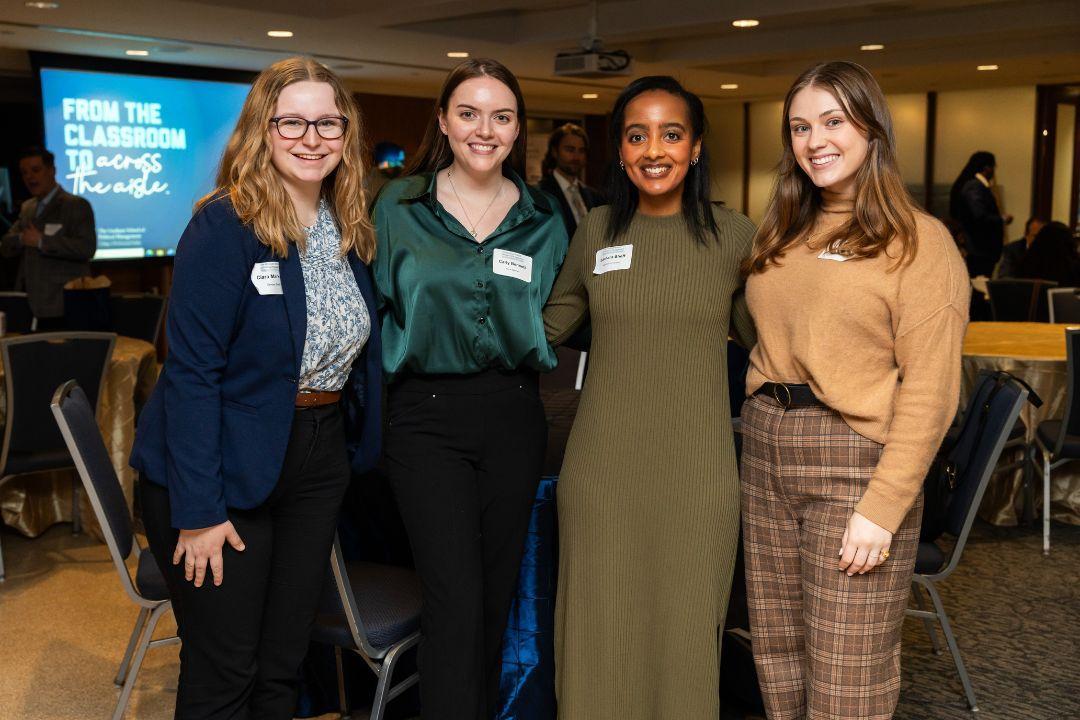Public Relations and Communications
Storytelling Made
Powerful by You
With the media cycle moving at such a rapid pace, today’s leading public relations practitioners must go beyond traditional methods to accomplish their communications goals. Digital and social media-based communication and 24/7 access to breaking news have heightened the need for PR strategists to be informed and ready to respond at all times. We offer a comprehensive learning experience to help our students manage this ever-changing landscape for their clients, companies, and/or causes.
Master the skills that matter today — and shape tomorrow.
The Master’s in Public Relations and Communications empowers communicators in government, nonprofit, and corporate sectors to lead and thrive. We shape future leaders through advanced education, training, and professional development.
Our program equips professionals with essential knowledge, skills, and ethical grounding for success in public relations, public affairs, and communications. Combining academic rigor with real-world challenges, students excel in strategic communication, media relations, crisis management, and digital skills, driving meaningful social change.
Students can choose from three concentrations: Corporate
Communications, Government Communications and Public Affairs, and Nonprofit Communications.
Program Objectives
From developing strategic communication plans to mastering writing and digital skills, media relations, crisis management, and organizational communications, students gain a comprehensive toolkit for success. Upon completion of the Master’s in Public Relations and Communications, students will be able to:
- Develop, implement, evaluate, and deliver strategic communication and public relations plans that align with organizational/client goals and ethical standards of practice;
- Conduct research, analyze and synthesize data, and apply insights to inform or evaluate communication strategies;
- Identify and execute the most effective communication strategy by leveraging digital platforms and/or cultivating and sustaining relationships with media outlets, journalists, or other stakeholders;
- Adapt communication strategies in a variety of contexts, including for diverse or international audiences; in high-stakes, crisis situations; and for effective change or reputation management;
- Collaborate and communicate effectively with other professionals and potential clients.
Choose a Program Concentration that Aligns with Your Career Goals
Formerly known as Strategic Public Relations, the redesigned program offers three concentrations, giving students the flexibility to shape their career paths in the public relations and communications industry.
Government Communications and Public Affairs Concentration
Prepares students for leadership roles by teaching strategic communication, public policy advocacy, and media relations within governmental and public sector contexts.
Corporate Communications
Equips students with advanced skills in strategic planning, media relations, digital communication, and crisis management, preparing them for leadership roles in diverse corporate environments.
Nonprofit Communications
Trains students in strategic communication, media relations, and advocacy, specifically tailored to the unique needs and goals of nonprofit organizations.
Program Curriculum and Requirements
You can complete this 30-credit master's program in as little as 18 months, including a two-semester, hands-on capstone project.
This program caters to current and aspiring public relations and communications professionals, offering a comprehensive curriculum aimed at developing strategic communicators adept at shaping narratives, building relationships and credibility, and responding to contemporary and emerging challenges.
Learn from Educators with Experience
Students learn from experts with experience working in Fortune 500 companies, nonprofits, journalism, and government. They bring vast experience in issues and crisis management, media relations, and global public relations. The result is a hands-on, practical education that teaches you how to get results on target and on budget.
Our faculty, composed of seasoned practitioners and scholars, are committed to mentoring students toward their individual career objectives. Through active learning opportunities and projects with prominent Washington, DC-based entities, students not only gain theoretical understanding, but also practical experience, ensuring they are well-prepared to advance in their careers.
Take Advantage of GW's Connections in the Nation's Capital
Reflecting our heritage and location in the nation’s capital, our degree programs provide our students with an understanding of how politics and government impact business, technology, and communications.
We are laser focused on preparing our students for a range of careers at public relations agencies, at non-profits, in government, and at major corporations.
"Our focus on the nonprofit, corporate, and government sectors is at the core of where the world is heading and GWU is proud to be at its forefront. Thoughtful curriculum, meaningful education, and memorable experiences will exist in our school to shape the future of PR practitioners who want to make a change. And they will."
Lesley J. Lopez
Program Director & Assistant Professor

Public Relations and Communications Program Sampler on GW RevU
Discover the perfect opportunity to experience the quality and innovation of our educational offerings with our complimentary, self-paced Public Relations and Communications program sampler. Designed to give you a glimpse into our curriculum, the sampler is tailored to meet the ever-evolving demands of today’s competitive job market.
















